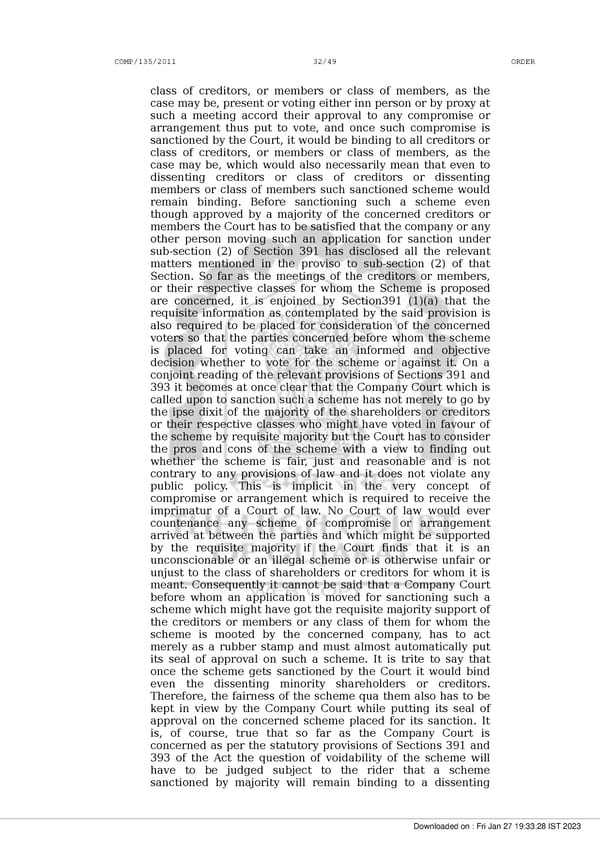COMP/135/2011 32/49 ORDER class of creditors, or members or class of members, as the case may be, present or voting either inn person or by proxy at such a meeting accord their approval to any compromise or arrangement thus put to vote, and once such compromise is sanctioned by the Court, it would be binding to all creditors or class of creditors, or members or class of members, as the case may be, which would also necessarily mean that even to dissenting creditors or class of creditors or dissenting members or class of members such sanctioned scheme would remain binding. Before sanctioning such a scheme even though approved by a majority of the concerned creditors or members the Court has to be satisfied that the company or any other person moving such an application for sanction under sub-section (2) of Section 391 has disclosed all the relevant matters mentioned in the proviso to sub-section (2) of that Section. So far as the meetings of the creditors or members, or their respective classes for whom the Scheme is proposed are concerned, it is enjoined by Section391 (1)(a) that the requisite information as contemplated by the said provision is also required to be placed for consideration of the concerned voters so that the parties concerned before whom the scheme is placed for voting can take an informed and objective decision whether to vote for the scheme or against it. On a conjoint reading of the relevant provisions of Sections 391 and 393 it becomes at once clear that the Company Court which is called upon to sanction such a scheme has not merely to go by the ipse dixit of the majority of the shareholders or creditors or their respective classes who might have voted in favour of the scheme by requisite majority but the Court has to consider the pros and cons of the scheme with a view to finding out whether the scheme is fair, just and reasonable and is not contrary to any provisions of law and it does not violate any public policy. This is implicit in the very concept of compromise or arrangement which is required to receive the imprimatur of a Court of law. No Court of law would ever countenance any scheme of compromise or arrangement arrived at between the parties and which might be supported by the requisite majority if the Court finds that it is an unconscionable or an illegal scheme or is otherwise unfair or unjust to the class of shareholders or creditors for whom it is meant. Consequently it cannot be said that a Company Court before whom an application is moved for sanctioning such a scheme which might have got the requisite majority support of the creditors or members or any class of them for whom the scheme is mooted by the concerned company, has to act merely as a rubber stamp and must almost automatically put its seal of approval on such a scheme. It is trite to say that once the scheme gets sanctioned by the Court it would bind even the dissenting minority shareholders or creditors. Therefore, the fairness of the scheme qua them also has to be kept in view by the Company Court while putting its seal of approval on the concerned scheme placed for its sanction. It is, of course, true that so far as the Company Court is concerned as per the statutory provisions of Sections 391 and 393 of the Act the question of voidability of the scheme will have to be judged subject to the rider that a scheme sanctioned by majority will remain binding to a dissenting Downloaded on : Fri Jan 27 19:33:28 IST 2023
 Adani Response Page 381 Page 383
Adani Response Page 381 Page 383